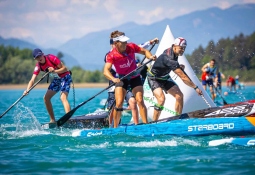American Blake Haxton had been toying with the idea of competing in two sports at the Tokyo Paralympics for some time, but was never really sure if the stars would align for him.
Having made his Paralympic debut in rowing in Rio in 2016, he had since taken a fancy to paracanoe. When the Tokyo schedule revealed it would be possible, the 30-year-old decided it was time to get serious about his canoe career.
“When I saw the schedule come out, I thought maybe with three or four days off, especially with canoe coming after the rowing, going from 2k down to 200 is probably a lot better than going from 200 up to 2k,”Haxton said.
“We spent the summer in the canoe, I feel much more experienced. Got myself a new paddle, a bit of a new rig, and my buddies back home spent a lot of time on the water with me, just really trying to fine tune just paddling the boat.
“It feels great, I really appreciate the support of the team, the canoe team and the rowing team have both been really accommodating and great about everything I needed. The set-up for me to be able to do this was huge.”
On Thursday he officially became the first paracanoe athlete to compete in a second sport at a Paralympics, and a strong second place in his VL2 heat would seem to justify his decision to add canoeing to his repertoire.
But it’s likely to be a once off.. and it won’t be paracanoe that gets the chop.
“I suppose I can do both into the future, but I think I’m probably gone as a rower,” Haxton said, reflecting on his 10th placing in his rowing event earlier in the Games.
“We’ve been talking about it, I’ve had a great run in rowing, but I think that might have ended here a couple of days ago. But I definitely plan on continuing in the canoe no matter what happens.”
He has no regrets about his decision to take on two events. He believes the rowing has made him better prepared for the paracanoe.
“I feel pretty good, I feel fully recovered from the rowing,” he said.
“If anything I think having some racing a few days ago probably kept me in top form, so I think they were good for each other.”
He found the biggest challenge was not physical, but mental.
“It’s a mindset thing,” Haxton said.
“In rowing, with 2000 metres in 10 minutes, you’re not going to decide the race in four or five strokes, you won’t decide it at the start. More or less you can make a few mistakes along the way, and probably have the same result.
“Paddling is just not like that at all. You really need to be urgent, you really need to get all over the front end and just try to hang on in the finish. It’s definitely just a shift in attitude a little bit.”
Haxton will get the chance to make his first paracanoe Paralympics final when he contests the VL2 semi-final on Saturday.

